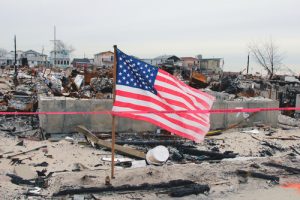
Three bills to reform the Federal Emergency Management Agency’s (FEMA) processes for making disaster declarations and for recovering grant assistance recently cleared the House, thanks to efforts led by U.S. Reps. Rodney Davis (R-IL), Brian Mast (R-FL) and Garret Graves (R-LA).
The bipartisan bills will help reduce the burdens on state and local governments that are struggling to recover from disasters.
H.R. 1665, which was introduced by Davis, would require FEMA to consider local impact when determining whether to recommend a major disaster declaration. Legislation from Mast, H.R. 1678, would establish a statute of limitations for FEMA to recover grant assistance. And H.R. 1679, which was sponsored by Graves, would make the FEMA grant application process more accessible.
“Recent severe weather in Illinois and across the Midwest reminds us that it is imperative we change the way FEMA determines the need for disaster relief,” Davis said. “Right now, the amount Illinois has to reach to receive federal public assistance after a major disaster is $18 million — nearly double that of any of our neighboring states.”
That bill aims to make the process more equitable for small communities by requiring FEMA to consider local impact when making major disaster declaration recommendations.
“Time and time again rural communities in my state and others have been denied assistance and unfairly punished by this formula,” Davis said. “H.R. 1665 simply requires FEMA to take a greater look at the localized impact of a disaster, rather than just an arbitrary per-capita formula.”
H.R. 1678 re-establishes a three-year statute of limitations on actions to recover FEMA grants provided to state or local governments following a declared disaster, unless there’s evidence of waste, fraud or abuse. Under current law, FEMA has the authority to recover disaster assistance grants that are unspent at any time after the date of disbursement, but lawmakers say it is inappropriate for FEMA to recover funds many years after the disaster.
In highlighting the need for FEMA reforms, Mast noted that wildfires were being fought in Florida, and that it’s the beginning of another hurricane season. “These FEMA reforms are critical to ensuring the federal government fulfills its responsibility to help states recover when disaster strikes,” Mast said.
H.R. 1679, the FEMA Accountability, Modernization and Transparency Act, would modernize how FEMA manages grant programs with the goal of improving accessibility and transparency for applications.
“It’s just wrong that disaster victims are often re-victimized by FEMA inefficiencies,” Graves said. “Disaster victims still have to dial an 800 number, sit on hold and wait for one of the hundreds of FEMA employees to search a database to get an update on a claim’s status. The whole process is filled with uncertainty, is expensive and leaves taxpayers feeling extraordinarily frustrated,” he said.
The bipartisan reforms, Graves added, would make strides in helping FEMA “perform at a higher level.”



